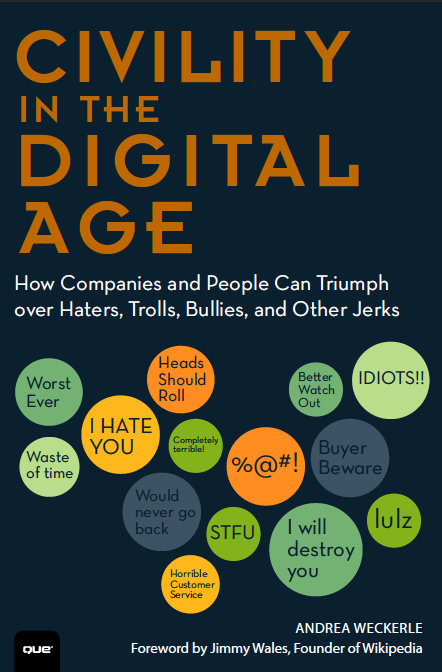aNewDomain.net In this first of her ongoing series, our Madison Andrews interviews VIPs up close and personal. This week, she talks to Andrea Weckerle, whose new book, Civility in the Digital Age: How Companies and People Can Triumph Over Haters, Trolls, Bullies, and Other Jerks, explores every aspect of online civility — and the lack of it.
Everyone has encountered the online hater in one form or another. You know the hater as that bully who sidelines an online forum with mean or distracting remarks or one who viciously attacks your online community or company.
I talked about the issue to Weckerle — who runs the non-profit CiviliNation, on which Wikipedia founder Jimmy Wales also serves on its board of directors.
In the book, Weckerle reveals a shocking history of online abuse. She opens with a gut-wrenching account of feminist pop culture media critic Anita Sarkeesian’s experience with online attacks. After launching her Kickstarter project “Tropes vs. Women in Video Games,” Sarkeesian became the target of vicious harassment.
Vindictive hackers and haters posted personal information from her email and social media accounts online. They shared vile photoshopped images of her across the web, descriptions of which are unfit to reprint here.The result wasn’t just a bashing of Sarkeesian’s online reputation. The attacks amounted to psychological and physical threats, too.
Nevertheless, Weckerle maintains an optimistic, we-can-fix-it attitude toward the future of online civility. I had the pleasure of speaking with her recently about all manner of online jerks. In our interview, she explains why it is so important to minimize conflict, and how to recognize an online jerk.
MA: Why is it important for our society as a whole to become more civil online?
Weckerle: In order for society to function smoothly, historically humans have created social norms and expectations, as well as rules of behavior, that offer a framework for how we can effectively balance the need for self-expression with the need to peacefully co-exist. Emphasizing civility enables us to share our viewpoints on sometimes hotly-contested and difficult social issues while still recognizing our opponents as individuals who should be treated with a basic level of respect.
MA: In your book, you say that the challenge is not to “eliminate all conflict, but rather unresolved conflict that’s risen to the level in which it negatively interferes with or affects something believed important by one or more of the parties involved.” How can unresolved conflict negatively interfere with our lives?
Weckerle: Conflict isn’t a bad thing in and of itself, and instead can, under the right conditions, create an opportunity to work through differences in a constructive way. However, when people engage in negative conflict, they’re less interested in trying to see if they can come to a mutually beneficial resolution than they are in maintaining power over the other side and trying to prove they are “right,” regardless of the methods used or the people hurt.
On the personal side, ongoing or unresolved negative conflict can create stress and lead to anxiety and depression, lead to diminished work productivity or job loss, social isolation, reputational damage, and — in severe cases — thoughts of suicide. Of course, there are numerous negative effects of unresolved conflict on the business side of things as well.
MA: How can you recognize an online jerk?
Weckerle: Context is always critical, but in general there are two ways to recognize someone like that: Action and intent. For example, is the person engaging in attacking behavior, trying to inflame others, sidelining a conversation, damaging a company’s or individual’s reputation without a legitimate reason, or making ad hominem attacks? In general those are not constructive ways of managing differences.
In terms of intent, we can look at the person’s past behavior for clues, see if they are argumentative for the sake of being argumentative, examine whether they unfairly criticize and attack others to try to gain power over or denigrate them, see if they’re oblivious to the hurt or damage they’re inflicting on others, and look at whether they seem to enjoy the harm they cause.
MA: How do ‘nice’ people become online jerks themselves?
Weckerle: We need to differentiate between someone who has questionable character and someone who simply behaved in a less-than-stellar manner. Again, it’s a question of degree and circumstances. Sometimes people simply make mistakes — they transfer their frustration from an area of their life that’s not going as well as they want into their online behavior. They don’t think about how their actions might be interpreted more harshly by others than they intended, or they snap. But when someone engages in repeat, ongoing or chronic attacking behavior online, it’s definitely a problem. The issue there is less about outside circumstances and more of an inherent character issue.
MA: What anger management methods would you recommend when the potential for conflict arises?
Weckerle: All of Chapter Six — The 101 of Anger Management — is devoted to the issue of anger and anger management, so I encourage people to read that. For some brief pointers, readers can check out my commentary “Online Anger: Where It Comes From and How to Control It” at The Good Men Project.
MA: What are the best ways to deal with — or avoid — online jerks?
Weckerle: There is no 100 percent foolproof way to avoid such people, since the Internet is an environment where individuals with different views come together and engage. In terms of how to best deal with such people, that depends a lot on what their reasons for acting questionably or inappropriately are.
Someone who is venting online because they’re frustrated with bad service and feel their concerns aren’t being adequately addressed by a company can be dealt with much differently than someone whose hobby is to wreak havoc online for personal entertainment. The former is interested in resolving their problem, and can therefore be approached in a helpful and respectful way, while the latter will often try to up the ante and get a reaction out of those they’re intentionally antagonizing.
A big part of successfully dealing with online jerks is to manage one’s own behavior – make sure you know your own anger triggers, don’t fly off the handle when you see something you disagree with online, and don’t allow yourself to be emotionally hijacked by others. You can’t control others’ behavior, but you can definitely control your own.
MA: How pervasive is the perception that victims of online attacks are just ‘whining,’ and how can we change that perception?
Weckerle: The misconception that victims of online attacks are simply whiners is still quite strong, and that’s sad. The silly argument that people should just develop a thicker skin when they’re online is also frequently made, as is the argument that victims either “asked for” or “deserved” the online attacks perpetrated against them.
These ignorant statements are often made by people who are attackers themselves, those who don’t want to examine their own questionable behavior, or those who simply don’t understand the reality of how easy it is to harm someone psychologically and reputationally online. But when people have a friend or family member who is unfairly attacked, or when it happens to them, suddenly they realize that these types of things can happen to anyone. Fortunately, as a collective we’re slowly becoming more enlightened and aware of the prevalence and seriousness of online attacks.
MA: What are some of the most dangerous types of online jerks?
Weckerle: The book goes into great detail about the various types of online antagonists. It describes the difference between trolls, sockpuppets, cyberbullies, harassers and defamers, difficult people such as the power-hungry and the aggressive who leave victims in their wake — and dangerous people like online stalkers. All of these can be harmful in their own unique way, either by threatening and even destroying someone’s reputation or livelihood, or by directly threatening an individual and their family’s physical safety.
But the motivations behind the behaviors are often different. Trolls, for example, thrive on the emotional reactions of their victims and often go after those they believe are weak, naive and make for easy targets. Sockpuppets, meanwhile, assume fake identities with the intention of misleading, either for personal gain or to harm others.

Be sure to check out Civility in the Digital Age for more insights from Andrea Weckerle.It’s available at Amazon and Barnes&Noble.













